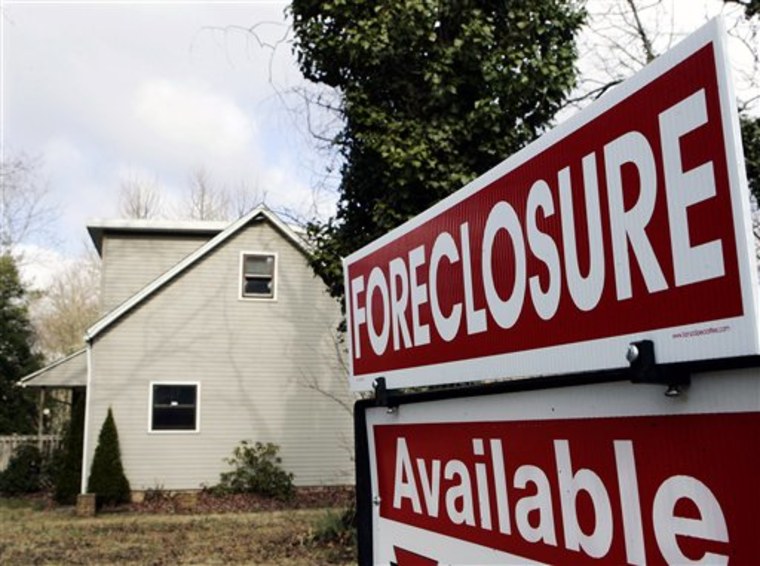The letter may look like a government form. The logo may seem official. The Web site address may sound like an agency that can help.
But there's a good chance it may all be a scam.
The ongoing mortgage foreclosure crisis has sparked a cottage industry of so-called "foreclosure rescue" companies. But advocates and government officials warn that a significant number are little more than fraudulent operations designed to separate distressed homeowners from their money, and sometimes their houses as well.
"They prey upon the financially unsophisticated," said Gail Cunningham of the National Foundation for Credit Counseling. "Anyone can easily fall victim to such scams. When you're hurting, we may all become financially unsophisticated."
Many of these companies have popped up as the mortgage meltdown accelerated, said Gary Almond of the Better Business Bureau in Los Angeles, one of the areas hardest hit by the housing crisis. "As the degradation in the market progressed, more (companies) got on the bandwagon," he said.
Because of the role the mortgage industry plays in the nation's economy and the types of crimes mortgage fraud represents, these companies have even drawn scrutiny from the FBI. The feds currently have nearly 2,350 mortgage fraud cases, up almost 400 percent from five years ago.
"With people losing homes, you're at your most vulnerable," said Roscoe Howard, a Treasury Department spokesman. "It's a lot like being a poor swimmer and being thrown into a lake, you're going to reach for whatever you can."
Even for wary consumers, it may be hard to tell if the line being thrown by a company will sink you.
A letter sent out earlier this month by Bridgewater, N.J.-based Financial Solutions Today LLC is a good example of the difficulty assessing a company.
The letter is designed to resemble a W-2 or other form from the Internal Revenue Service, with boxes across the top and a similar typeface. It suggests the recipient "may be eligible for a special modification program according to guidelines created in conjunction with the Government Stimulus Program HR 1106: Helping Families Save Their Home Act."
The bill that bore that number in the House of Representatives actually used the plural "Homes" in its title, a subtle misspelling that consumer advocates say is the type of thing that should be a red flag for recipients.
The letter also states "only an attorney or licensed debt adjuster can legally represent a borrower for a mortgage modification."
That's not true, said Dan Crevina, director of operations and marketing at the BBB of New Jersey. "There's no need to have representation to call the bank," he said. "They're going to do the same thing that the consumer can."
Financial Solutions Today President Frank Riccio said the letter in question was changed, although he claimed the modification took place weeks before the copy obtained by The Associated Press was received. "That was just an overflow," he said. "I don't like the way it looks."
Riccio declined to discuss his business practices beyond the letter and did not return follow-up calls.
Yet Financial Solutions Today, which also does business as Home Rescue Today LLC, is accredited by the BBB. That means it was reviewed by the consumer watchdog and pledged to "abide by a set of ethical standards for marketplace conduct," according to the BBB Web site. The BBB has received only one complaint against the company, which Crevina said was about spam e-mails, and was resolved.
One comment in the Financial Solutions letter even echoes the advice from advocates and government agencies when consumers are considering turning to a private company for help: "Beware of companies that ask you to pay for services upfront."
Nonprofit agencies that are working with government programs to help homeowners in danger of foreclosure don't charge for the services they offer, and some states prohibit lenders from charging fees in advance of providing services.
Homeowners can call the federal government's Hope Now program at 888-995-HOPE, or visit the program's to find legitimate assistance. The site has a calendar of free events around the country where help is available on site, and lists approved nonprofit counseling agencies nationwide that offer free help.
Details about government programs and counseling referrals are also available .
The companies operating scams use a variety of ways to find their targets. Besides advertising heavily, they also search public records for default notices or mortgages written in the last few years by banks known to issue risky loans, and then send letters or make calls to those addresses.
Last month, the FTC filed lawsuits against five companies as part of a crackdown on mortgage modification and foreclosure rescue scams, the latest in a series of suits aimed at such swindlers. One of those companies, Federal Loan Modification Law Center LLP, generated 168 complaints to the BBB office in LA.
The FTC said these companies touted so-called guarantees and high success rates to mislead consumers about their services; charge upfront fees that legitimate nonprofit organizations do not charge; and use copycat names or look-alike Web sites to appear to be a nonprofit or government entity.
The agency also sent warning letters to 71 other firms "that are marketing potentially deceptive mortgage modification and foreclosure assistance programs." It would not identify those companies.
Some would no doubt be familiar to Crevina at the New Jersey BBB. He's dealt with at least a dozen companies that stopped answering BBB inquiries, and he now simply refers new complaints about them to enforcement agencies. "There are certain names that I hear and I know automatically how we're going to end up handling it," he said. "And the list is growing."
